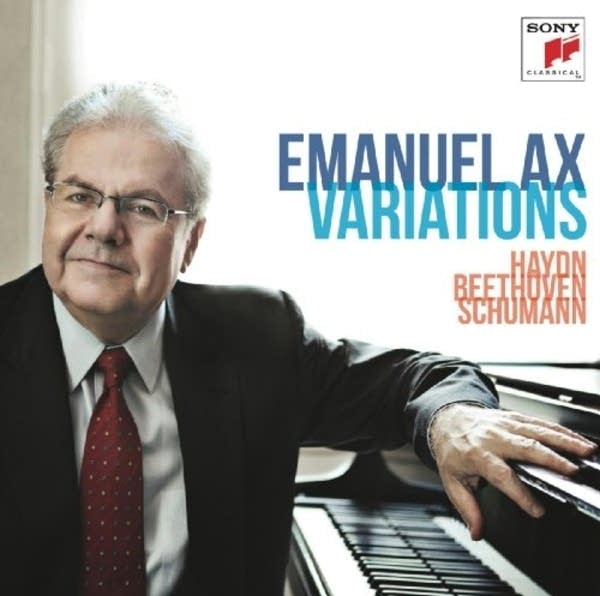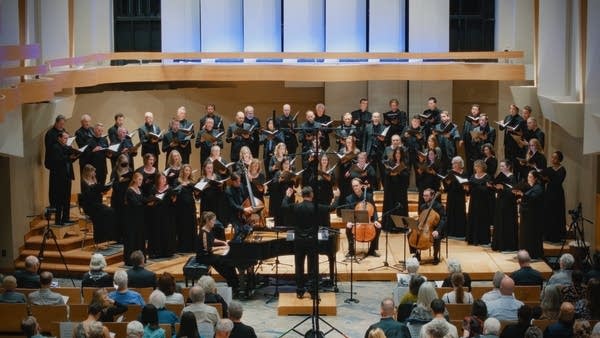
Pianist Emanuel Ax is covering a lot of ground these days. As artist-in-residence with the New York Philharmonic this season, he's performing everything from Bach to Christopher Rouse. He's an ardent supporter of new works, having commissioned several in the past two years, yet his Grammy-winning sonata recordings of Haydn, Beethoven and Brahms are a reflection of his strong roots in the standard repertoire. Ax returns to a variation of those roots on his latest recording. In fact, Variations is the title of this new collection which features a few rarely heard variations composed by Beethoven, Haydn and Schumann, with a special bonus track of Aaron Copland's Piano Variations included with the digital download only.
"I think variations are something that the great composers actually all wrote a lot of, in a sense, all music is variation," Ax explains. "But certainly sets of variations are in a way, the composer's ability to flex his compositional muscles. They can prove how brilliant they are. Certainly Beethoven was very conscious of that. He could write sets of variations that were so far superior to everyone around him."
Proof of Beethoven's brilliance is heard in his Variations and Fugue for Piano in E-flat Major, Op. 35. They're based on a melody extracted from his Eroica Symphony, the Symphony No. 3. Emanuel Ax says these variations in particular are quite original.
"A piece like the Beethoven Eroica Variations — I think it sounds as unusual, revolutionary and exciting as it probably did to his audience, even now. It's incredibly brilliant. The sheer scope of it, the sheer size, is something that never occurred before in that era. And I think this is a very thrilling piece to listen to, even for us.
"One of the things about this particular tune, is that he used it in two pieces — this set of variations and the variations that close the Third Symphony. And of course that piece was an incredible explosion in every way. It was so much longer than any other symphony,so much more brilliant, faster, louder, softer, more expressive — you name it. It had dimensions that had never occurred before. I guess the theme meant something special to him."
Joseph Haydn isn't known for his skills as a pianist, yet he had the ability to compose highly challenging works for the instrument. One of those pieces is the Andante and Variations in f minor which appear on this recording. Emanuel Ax says this piece is one he really enjoys playing. "This set is kind of an experiment in two different themes because there's a minor theme and a major theme. He varies both of them, one after another, and in the end manages to combine the two, in this incredible romantic, dramatic explosion. It's probably my favorite piece of Haydn,. And this kind of experiment between the major and minor variations and the different moods is very rarely done by anyone."
Often, "etudes" are study pieces meant to improve a musician's playing skills. Robert Schumann's Symphonic Etudes, according to Emanuel Ax, are quite a challenge — which is why he waited so long to finally learn them. "Oh yeah, well, they're called 'etude' I guess for a reason. They're very hard etudes in the form of variations. Of course, I'm a tremendous Schumann fan, always have been. This is a piece I didn't study until about two and a half years ago. I didn't know if I could play it. And I decided I would just spend a lot of time and try and see if I could manage it and somehow I guess I'm managing it."
"There's a lot of music that I have doubts about being able to play. Part of it is just the sheer virtuosity and velocity that it requires. I think there are many pianists that play with greater ease, accuracy and ability than I do. So I guess I've always felt a little bit worried about that aspect of things. I don't play much Russian music, for example. I don't play the Rachmaninoff concertos, or haven't since I was a kid. And so I worry a little bit. But if you work hard, I think it's manageable, this piece at any rate."
It's hard to imagine Emanuel Ax being afraid of any piece of music, but then again, when he's challenged he always produces incredible results for all of us to enjoy.
Love the music?
Show your support by making a gift to YourClassical.
Each day, we’re here for you with thoughtful streams that set the tone for your day – not to mention the stories and programs that inspire you to new discovery and help you explore the music you love.
YourClassical is available for free, because we are listener-supported public media. Take a moment to make your gift today.
Your Donation
About New Classical Tracks®
Host Julie Amacher provides an in-depth exploration of a new classical music release each week.
Subscribe on Apple Podcasts, TuneIn, Radio Public, or RSS.











